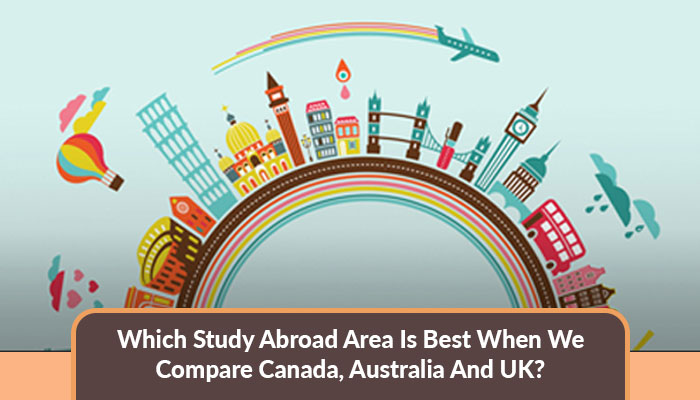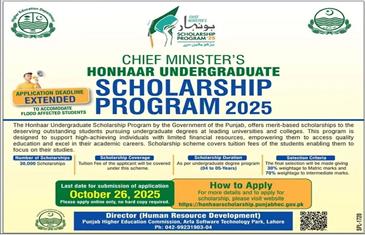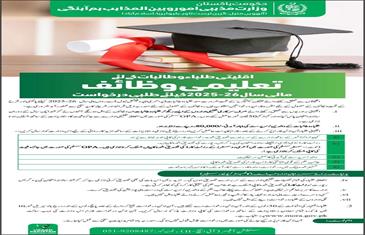Which Study Abroad Area Is Best When We Compare Canada, Australia And UK?
May 10, 2022 • 5672 Views

Study abroad expert advice
Don't waste time! just fill the form to get help.
Numerous students wish to fulfill their dream of being an overseas student, but it become tough when comes to invest millions of rupees. It would be wise to compare the return on investment after years to make final decision. Here the comparison of three study destinations for Pakistani students like Canada, Australia and UK based on return on investment.
On What Parameters This Comparison Made?
This comparison based on the following parameters
-
Cost of study (including tuition fee, living and travelling expenses)
-
Education loan cost
-
Average income before pursuing the course
1. Canada As Top Study Abroad Destination And Its Return On Investment
Canada is the most preferred destination for Pakistanis for study as overseas student because of longer post study work visa and easy PR opportunities. The maximum duration of stay after master’s degree in Canada is 3 years and the average tuition fee for the master’s degree is 65 to 70 Lakhs Pakistani rupees. Annual cost of living in Canada is almost 15-18 lakhs. The total estimated cost including tuition fee and living is 90 lakhs.
Education Loan Option
Students can take an education loan of 55-60 lakhs. The remaining expenses can be managed by the part time job as student can work up to 40 hours in a week. And estimated earning per hour in Canada is 20 CAD/ hour. If we talk about salary after completion of course, it is approximately 55000 CAD (75 lakhs).
Return On Investment In Canada
Compare the current salary of student in Pakistan and salary after master’s degree from Canada. If the applicant earning almost 5 lakhs in Pakistan then the return on investment will be positive and it is best option for him/ her to start study in Canada. But if earning more than 20 Lakh then the return on investment will not be positive and he/ she should not make decision to study in Canada.
2. Australia As Top Study Abroad Destination
After strict COVID-19 protocols, Australia has reopened its borders for international students. Several provision are introduced to attract international students including increasing in part time working hours, visa fee and scholarship schemes. The stay back period for a graduate student in Australia is 2 years. The average annual cost of master’s study is 38000 AUD (48 lakhs) so the total cost of master’s degree in Australia is 80-90 lakh PKR. And total estimated living cost in Australia is 20-25 lakhs.
Education Loan Amount In Australia
The average education loan value runs up to 95-105 lakhs wherein the student can manage its remaining cost with a part time work. Per hour earning during part time work in Australia is 19 AUD. The average income of a master graduate in Australia is 60- 70 lakhs.
If the student is already earning 15 lakh in Pakistan the return on investment would be positive as the education cost in Australia is less compare to average salary after masters from Australia. If earning more than 20 lakh then return on investment would be negative.
3. UK As Top Study Abroad Destination And Its Return On Investment
UK allows 2 years stay back after completion of study course from UK universities. The new point based immigration also leads to a 40% increase in the number of international students receiving skilled workers visas in 2021.
Investment Required To Study In UK
The average cost of education in UK is 70-78 lakhs PKR for a post graduate master’s degree. The average living expenses in UK is 2 lakhs/month. And a student can take an education loan of almost 80 lakhs. The average expected salary for master graduated student in Australia is 60-65 lakhs annually after the course.
Return On Investment
If the student was earning 5 lakh annually in Pakistan then the study plan to UK will be positive as the return on investment is promising even if the student is admitted to university of any rank. If the pre- study earning of student is 20-25 lakh the return would not be positive. The student will sacrifice the yearly salary and job experience for master’s course and return will be negative.
So the student must select the country for study abroad according to the present earning in home country and return after graduation.
Related News
Consultants for Pakistan
Scholarships in Pakistan
-
 Pakistan
PakistanPakistan Minorities’ Welfare Fund Scholarships 2025-26 for Pakistani Students
-
 Pakistan
PakistanHonhaar Scholarship Program 2025 – Apply Online for Merit Scholarships
-
 Pakistan
PakistanMinority Students Scholarships 2025-26 Announced by Ministry of Religious Affairs Pakistan
-
 Pakistan
PakistanHigher Education Commission (HEC) Pakistan

_11zon (1).jpg)




.jpg)




.png)